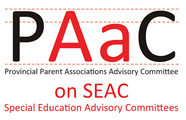This handbook has been created with support from a Ministry of Education Parent Engagement Office Parents Reaching Out Grant with the lead agency being the Ontario Brain Injury Association (OBIA). The views and ideas included in the handbook belong to the members of the Provincial Parent Associations Advisory Committee on Special Education Advisory Committees (PAAC on SEAC) and do not necessarily reflect those of the Ministry of Education.
The PAAC on SEAC Effective Practices Handbook is available electronically, in both English and French, on the PAAC on SEAC website at www.paac-seac.ca or from any of the member associations.
The PAAC on SEAC Effective Practices Handbook for SEAC members (2016) is a revision of the handbook developed in 2010. PAAC on SEAC has a history of developing guides for SEAC members, including the Handbook for Members of Special Education Advisory Committees produced by PAAC on SEAC in 1985, 1995 and 2001. The handbook content builds on the work by Marilyn Dolmage, Derryn Gill, Eva Nichols, Alison Morse, Diane Wagner, Lynn Ziraldo and others, who have developed PAAC on SEAC and SEAC training resources over the years.
Published by PAAC on SEAC
Handbook Committee Members
Alison Morse
Barbara Cyr
Claude Ouellet
Lynne Carter
Tracy Grant
Editing Committe
Ann Smith
Diane Wagner
Marilyn Dolmage
Katie Muirhead
Jennifer Norquay (OBIA staff)
Translation Committe
Claude Ouellet
Lynne Carter
Suzanne Bonneville
Rachel Anne Normand-Révidacation (translator)
Introduction
The Provincial Parent Associations Advisory Committee on Special Education Advisory Committees (PAAC on SEAC) was established in 1983 to provide a forum for parent associations, whose members are eligible to sit on SEAC, to share ideas, compare strategies and address common concerns related to SEACs across the province. The provincial parent associations and their representatives are valuable resources not only to each other and to SEACs but to the Ministry of Education, school board officials, education and service providers, parents and the community at large.
Special Education Advisory Committees (SEACs) play an important role in the delivery of special education across Ontario. Each school board is required by law to establish SEACs to advise it on special education matters. SEAC members are important community volunteers whose contributions should be recognized and supported. Parents have been involved in SEACs since they were first established in the 1970s and their contributions have demonstrated the value of parent involvement in education.
The 2010 handbook, and the 2016 revisions, were made possible by a Parents Reaching Out grant from the Ministry of Education, Parent Engagement Office. The handbook was revised in response to the results of a PAAC on SEAC Survey of SEAC Effectiveness in 2014 and feedback from the 2015 SEAC Provincial Conference. This document is the latest version of the PAAC on SEAC handbook and builds on the Handbook for Members of Special Education Advisory Committees produced by PAAC on SEAC in 1985 and 1995. A review of the previous PAAC on SEAC handbooks, and the SEAC resources developed by the different parent association members, has helped to identify practices that have been demonstrated to improve the effectiveness of SEACs and support the engagement of members.
This handbook was designed for SEAC Members and Alternates who represent local associations and are affiliated with a provincial parent association. The handbook should also be helpful for all SEAC members and could be used by SEACs to evaluate their current practices and consider effective practices used by other SEACs. The handbook does not reflect any particular philosophy or exceptionality. SEAC members are encouraged to contact local association and/or provincial parent associations for further information regarding specific exceptionalities or disabilities, and for orientation and training supports.
